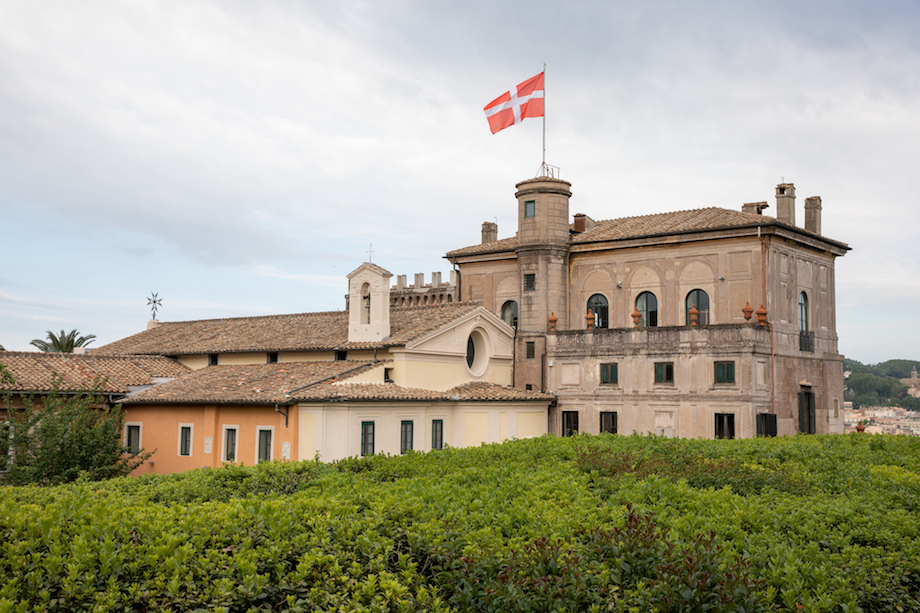On 29th April, Fra’ Giacomo Dalla Torre del Tempio di Sanguinetto, Prince and 80th Grand Master of the Sovereign Order of Malta died in Rome. According to article 17 of the Constitution, the Grand Commander, Fra’ Ruy Gonçalo do Valle Peixoto de Villas-Boas has assumed the functions of Lieutenant ad Interim and will remain at the head of the Sovereign Order of Malta until the election of the new Grand Master.
The Lieutenant ad Interim has convened the Council Complete of State for November 7 and 8, 2020. The most rigorous protocols will be applied in all the phases to avoid contagion from Covid-19.
The Council Complete of State
In accordance with the Sovereign Order of Malta’s Constitution (Article 23), the Council Complete of State is tasked with electing a Grand Master (for life) or a Lieutenant of the Grand Master (with the same powers as the Grand Master but in charge for one year). The Council has no other assignments.
Where
The election will take place in the Magistral Villa, one of the institutional seats of the Sovereign Order of Malta in Rome. The Villa is granted extraterritorial rights by the Italian Republic.
The 2020 Council Complete of State is composed of:
-Lieutenant ad Interim (1);
-Members of the Sovereign Council (9);
-Prelate (1);
-Procurators of Grand Priories (6);
-Professed Bailiffs (11);
-Professed Knights representing the Grand Priories (6);
-Professed Knight elected by the members in gremio religionis (1);
-Knight in obedience elected by the members in gremio religionis (1)
-Regents of the Subpriories (5);
-Presidents of the National Associations (15).
At this year’s Council Complete of State two women, Presidents of Associations – one European and one South American – will participate. The number of electors is 56.
Who is eligible
As stated in Article 13 of the Sovereign Order of Malta’s Constitution: ‘The Grand Master is elected for life by the Council Complete of State from among the Professed Knights with at least ten years in solemn vows if they are younger than fifty years of age; in the case of Professed Knights who are older, but who have been members of the Order for at least ten years, three years in solemn vows are sufficient.’
To serve as Grand Master a candidate must also satisfy the nobiliary requirements prescribed by the Order for the Knights of Honour and Devotion. There are 11 eligible candidates.
The requisites for the Lieutenant of the Grand Master are the same as those prescribed for the Grand Master.
The terna
The Professed Knights taking part in the Council Complete of State will convene at the Magistral Villa on the afternoon of 7 November. They have the right to propose three candidates to the Council Complete of State, the so-called ‘terna’.
Voting procedures
The Council Complete of State will commence on 8 November 2020 with Mass celebrated by the Prelate of the Order of Malta, Mons. Jean Laffitte. After the Mass, the electors will proceed to the tent set up in the Magistral Villa’s garden, due to the Covid-19 restrictions, where the voting will take place on a secret ballot.
A personal presence is required. No quorum is required for the election. Proxies are not permitted. Even those who are not present may be elected Grand Master or Lieutenant of Grand Master (provided they obviously meet the requirements). A majority plus one of the votes of those present is required to elect a Grand Master.
If the ‘terna’ is presented and a candidate is not elected from the ‘terna’ in the first three ballots, all voting members have freedom of choice in successive ballots amongst the 11 eligible Professed Knights.
After the election
The candidate elected to the office of Grand Master, or Lieutenant of the Grand Master, must acknowledge his acceptance or refusal of the office immediately (Article 191 of the Code of the Order).
Immediately after the election, the elected person communicates the result to the Pope through a letter brought to the Vatican by the Order of Malta’s Ambassador to the Holy See.
The oath
In the afternoon of 8 November the elected Grand Master, or Lieutenant of the Grand Master, will take his oath in in front of the Council Complete of State, in the presence of the Pope’s Special Delegate, the Cardinal-elect Silvano Tomasi.
Closing of the Council Complete of State
With the oath taken by the newly elected Head of the Order, the Council Complete of State is dissolved (article 194 of the Code of the Order).
The Grand Master
According to the Constitution, as the religious Superior and Sovereign, the Grand Master must fully dedicate himself to the development of the works of the Order and set an example of living by Christian principles to all the members of the Order. He is vested with supreme authorities.
Together with the Sovereign Council, the Grand Master issues the legislative measures not covered by the Constitution, promulgates government acts, manages the financial assets, ratifies international agreements and the summoning of the Chapter General. The States with which the Order has diplomatic relations recognize the Grand Master with the prerogatives, immunities and honours reserved for Heads of State. The Grand Master resides at the Order’s seat of government, the Magistral Palace in Rome.










